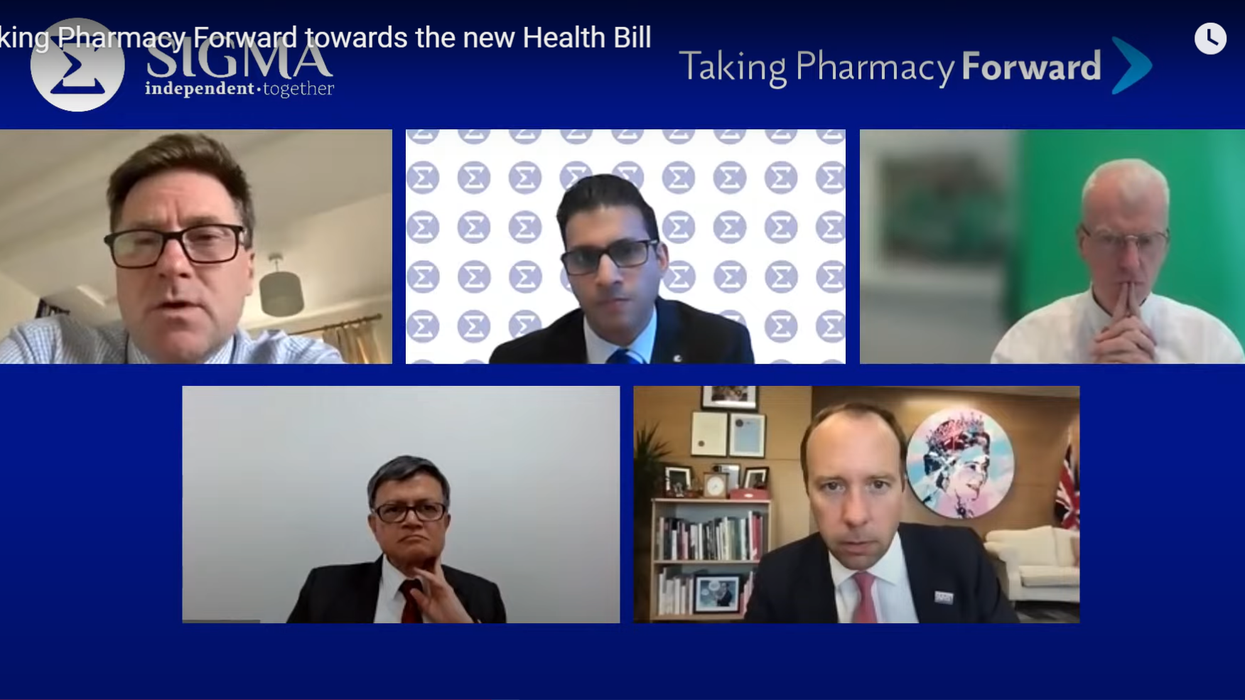MORE Covid-19 and flu vaccines will be delivered through community pharmacy, health secretary Matt Hancock said, as noted a “big shift” in the UK’s vaccination programme.
Such a move would allow community pharmacists to use their “clinical capabilities” and doctors to practise “medicine in the normal way” back in the surgeries, Hancock told a webinar hosted by Sigma Pharmaceuticals on Wednesday (23).
He also confirmed there will be a booster programme for Covid-19 vaccination in the autumn, but said the details, based on “some clinical results”, were yet to be set out.
Hancock paid tribute to community pharmacies, saying they were “at the heart of primary care” and had delivered more than five million vaccines so far. He praised them for persuading and reassuring people “to get vaccinated in order to keep themselves and their communities safe”.
“Nothing has shown the incredible capability of community pharmacy better than the vaccine programme,” he said, adding they had helped the country out of the pandemic.
Hancock singled out Cullimore Chemists, an independent community pharmacy in Edgware, London, and Superdrug in Guildford, Surrey as the pharmacies “that have done an unbelievable work”.
“Both of them have been operating a clinic every single day for over 150 days now. They are the longest operating, constantly operating pharmacy vaccination sites,” he added.
Admitting that he was a “great lover of community pharmacy”, the health secretary said, “it comes as no real surprise to me how much the sector has risen to the challenge during the pandemic – often you were the only shop on the street open in those worst of times during the darkest days of the lockdowns – making sure people get their medicines, making sure you're there for people and helping to keep people safe.”
New health and care bill
Responding to a question from Eastern Eye’s sister title Pharmacy Business on the new health and care bill, Hancock said: “We're reforming right across the board, and the underlying thread that ties them all together is that prevention is better than cure, and you (community pharmacy) are at the heart of that vision.”
The proposed legislative reforms aim to join up different parts of the NHS and allow Integrated Care Systems to play a greater role in delivering best possible care, paying particular attention to population health.
“Pharmacy is absolutely central to making that work because you're so often the first port of call,” the health secretary said.
“At the same time, we're riding the greatest wave of innovation in the history of healthcare because people have had to do things differently, they've had to act flexibly, and they've had to embrace the spirit of integration that's overcome traditional boundaries because there were no other choices.
“It's that spirit that runs through the health and care bill.”
Hancock said up to 20 million GP appointments could - and “should” – be referred to pharmacies who would take “pressure off the system” by reducing demand and helping people stay healthy.
“Whether it is about your advice and care, whether it's about early diagnosis and spotting problems soon, I want to see people with minor illnesses referred to pharmacies... We know that the revolution of home testing, and much more activity in the patient's own hand the citizens' own home, that revolution will roll on, and you have a huge role to play as usually, the closest and most convenient point of call.”
“Just imagine what we can achieve with your capabilities in the community, if we can pivot the entire NHS to a population health-based approach.
He said this winter “we've got to deliver the biggest ever flu vaccination programme, alongside the booster shots for Covid” because “almost nobody has had flu now for 18 months and we know immunity will be down.
“I have absolutely no doubt after everything that's been achieved in the past 18 months that you can help us rise to this challenge and play a major part in it.
“As we look ahead at their post pandemic world, where we learn to live with Covid, as we do with flu, we know we are not going back to the old ways of doing things.
French model
In response to a question, the health secretary explained why he often spoke of the ‘French model’ of pharmacy.
“The reason I talk about the French model is because so much more early primary care and preventative work is done in pharmacies in France than is normal in the UK.
“I use the French model as a way to try to describe what is now increasingly happening, and what I really need is for you to come to us with the different things that we can change to make it easier to do more and more in pharmacy.”
Hancock said he is a huge fan of the role community pharmacies play and that he is excited at “the other things we can do as we come out to the pandemic”.
Online pharmacy
Asked about his thoughts on the growth of online pharmacies during the pandemic, he said they had an “important role to play”.
“It’s a different business model, and we have to make sure that the way policy works takes that into account.”
Hancock was speaking in Sigma's the third webinar of a series entitled 'Taking Pharmacy Forward'.
Vaccine deployment minister Nadhim Zawahi addressed community pharmacy in the first webinar in February.




